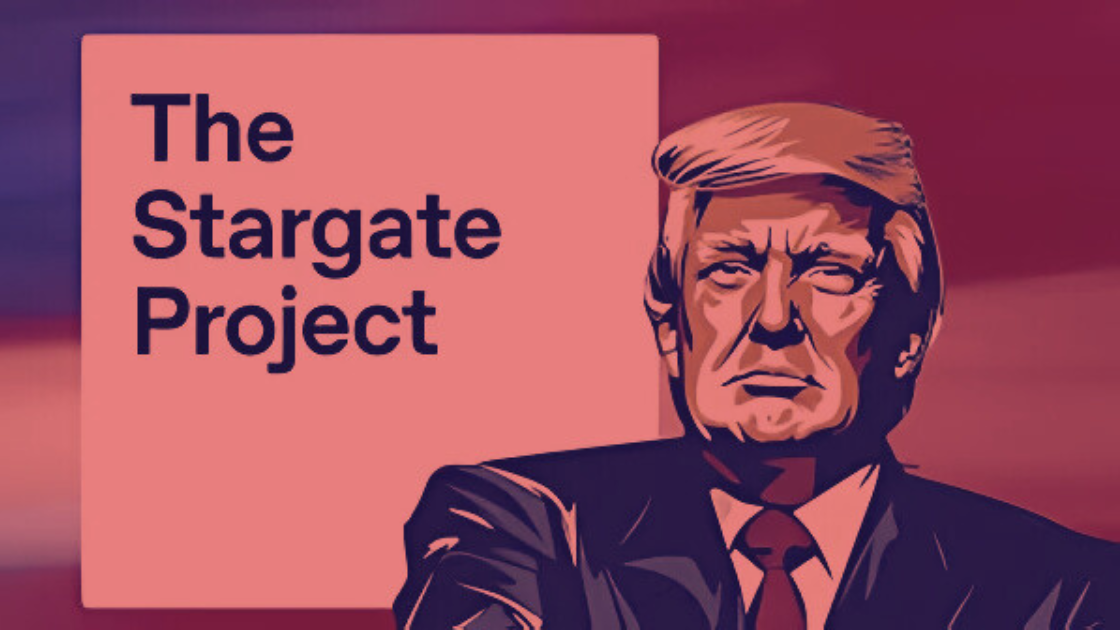The world of artificial intelligence is on the verge of a major transformation, and at the center of it all is a groundbreaking initiative known as the "Stargate Project."
This ambitious AI infrastructure project, backed by President Donald Trump, SoftBank CEO Masayoshi Son, Oracle's Larry Ellison, and OpenAI’s Sam Altman, is making waves across America and beyond.
With an initial investment of $100 billion and a long-term goal of reaching $500 billion, Stargate is being hailed as the largest AI infrastructure project in history.
The project’s announcement on January 21, 2025, at a White House press briefing set the stage for what could be the most significant AI development of the decade.
The primary aim of Stargate is to build a robust AI infrastructure that ensures the United States remains the global leader in artificial intelligence.
This includes constructing cutting-edge data centres, deploying advanced supercomputers, and developing core technology capable of supporting AI’s next evolutionary leap.
The project has already begun taking shape, with at least ten data centres under construction, including a massive one-million-square-foot facility in Texas.
It is expected to generate at least 100,000 jobs initially, with the potential for even more as the project scales.
One of the biggest questions surrounding Stargate is why such a massive infrastructure investment is necessary.
AI models like ChatGPT require extraordinary computing power, and this power comes from large-scale data centers that consume significant electricity and water resources for cooling.
With China aggressively investing in AI, the U.S. is determined to stay ahead. Sam Altman has been vocal about the urgent need for expanded AI infrastructure, warning that without it, America risks losing its competitive edge.
The partnership with Oracle and SoftBank, two tech giants with global reach, strengthens the project’s ability to achieve its ambitious goals.

Trump’s involvement in Stargate is not just about technology; it is deeply rooted in his broader vision for America’s economic and national security strategy. AI has the potential to revolutionize industries like healthcare, finance, and military operations, making it a critical asset for any nation’s global standing.
Trump’s administration has prioritized keeping AI advancements within American borders, ensuring that chip production and core technological developments remain under U.S. control. A key aspect of this strategy could involve changes to H1B visa policies.
There has been growing speculation that Trump’s administration might streamline H1B approvals for specialized AI and data center roles, potentially bringing in highly skilled workers from countries like India to support the rapid expansion of Stargate.
This has sparked debates, with critics arguing it could undercut American job opportunities, while supporters see it as a pragmatic move to fill talent gaps in a rapidly growing industry.
SoftBank’s involvement in the project adds another layer of complexity. The Japanese conglomerate has been a major investor in Indian tech startups, and its presence in Stargate suggests that the U.S. may be looking at global talent pools to execute its AI ambitions.
Oracle, on the other hand, is taking the lead in building and operating much of the underlying infrastructure, while Nvidia is expected to provide the powerful GPUs necessary to drive large-scale AI models.
Microsoft remains a player in the AI space but is no longer the exclusive provider of OpenAI’s capacity, signaling a shift in how AI development will be distributed among tech giants.
The regulatory landscape surrounding AI is also undergoing changes. The White House has been actively working to clear hurdles that could slow down AI advancements, and part of this strategy involves rolling back executive orders from the Biden era that sought to regulate AI risks.
Trump and his allies argue that the U.S. needs to accelerate AI development first and address regulatory concerns later. Larry Ellison and Sam Altman have strongly supported this approach, emphasizing that staying ahead in AI is not just about technological innovation but also about national security and economic dominance.
Educational institutions are also taking notice of the AI boom. Rice University in Houston is set to approve a new AI major for undergraduates by the fall of 2025, with faculty voting on the program in early February.
Other institutions like Carnegie Mellon and MIT are also expanding their AI programs to prepare the next generation of AI researchers and engineers who will play a crucial role in projects like Stargate.
The long-term implications of Stargate are profound. By controlling massive AI data centers, the U.S. aims to solidify its dominance in AI development while countering China’s rapid progress in the field.
A recent OpenAI white paper highlighted how controlling these facilities gives the U.S. a strategic advantage in shaping the future of AI. With global investment in AI initiatives estimated at $175 billion, attracting funds to American-backed projects rather than China-led alternatives is a critical priority.
Despite its massive scale and ambitious goals, Stargate is not without its skeptics. Some critics compare it to the failed Foxconn deal in Wisconsin, which initially promised a $10 billion investment but ultimately delivered far less.
However, the key difference is that Stargate is spearheaded by leading AI and enterprise technology firms, making it more likely to succeed. The combination of OpenAI’s cutting-edge research, SoftBank’s financial backing, Oracle’s enterprise expertise, and Trump’s aggressive push for AI dominance makes this project a force to be reckoned with.
The construction of data centers has already begun in Texas, and the job creation process is expected to accelerate in the coming months.
Industries ranging from healthcare to self-driving cars are set to benefit from Stargate’s advancements, making it a cornerstone of America’s AI-driven future.
Whether this project will achieve its ambitious goals remains to be seen, but one thing is clear—Stargate represents a major shift in how the U.S. is approaching AI development. With Trump, Altman, Son, and Ellison at the helm, the stakes have never been higher. The world is watching, and the battle for AI supremacy is just beginning.









